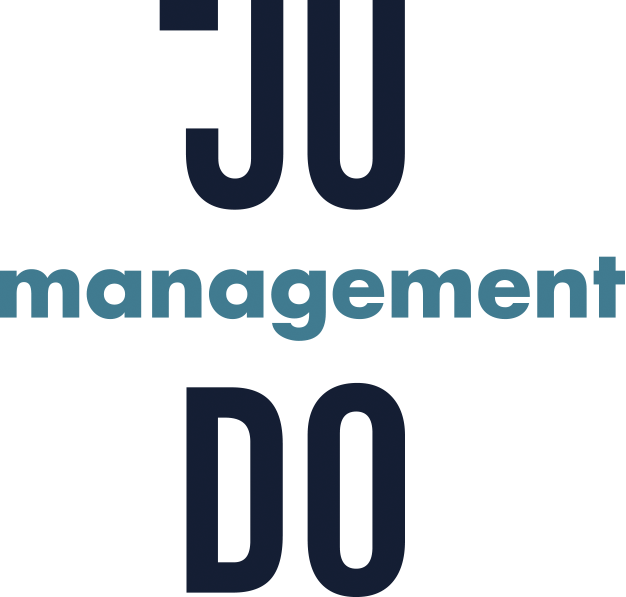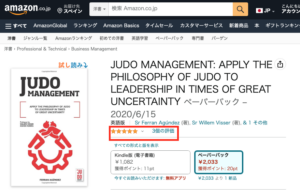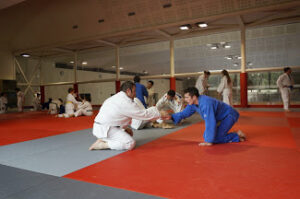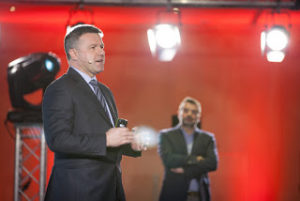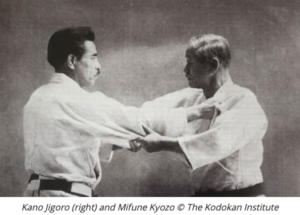In the article Judo, The importance of randori and kata, Willem Visser, 8th Dan Judo IJF, executive coach, strategic adviser, and international lecturer was writing that the main goal of randori is personal development.
In this article he describes the different aspects of that personal development.
Judo exists out of a lot of moving and very fast reaction. Those aspects require much of the ability to concentration and balance function.
Judoka are completely focussed in their training and play in a game of action and reaction, with the aim of disturbing each other’s balance and maintaining their own balance. The moments of action and reaction follow each other very quickly, while static and dynamic moments alternate again and again with the same goal: to unbalance the other and to maintain one’s own balance.
In addition to concentration, the coordinated application of biomechanics is of great importance and also makes judo a fast, dynamic and complex form of movement. The judo movements must be executed quickly in order not to give the opponents the opportunity to give a good motor response. At the same time one must react to ever changing posture and movement of the other judoka. This requires a lot of concentration, coordination and the balance function.
Judo is a two camp game, in which disturbing balance and keeping balance is essential. Because judoka are completely focussed on each other and sharp perception is strongly developed.
If a judoka wants to have results, then the judoka must give themselves, must show themselves and must act on its own, while attention and concentration are focussed with the opponent.
Through judo one reaches a state of balance and control, which can be developed into a moral culture. This is an attitude to life, in which a person learns to be fearless and in which courage and inner peace are cultivated. This is manifested mainly by immediate adaption in all circumstances.
One experiences the advantages and disadvantages of offensive and defensive action and one learns to distinguish offensive and defensive types. One learns that falling is relative and that the art of breaking one’s fall is not only necessary for safety, but also for the elimination of fear. Fear plays a very important role in the actions of man. Recognizing fear is an important step towards self-confidence. One learns to rise, and one learns that one must rise. One learns that one can fail, and one must put in effort over and over again, at least if one wants to continue to participate. One learns to push boundaries and one becomes aware of the equality of the other person.
The judo habits, the ritual, are strongly permeated by respect for the other person and the care for the other, the smaller or less strong ones are taken into account. Peace and harmony contribute to this.
Judo training is based on the above principles and leads to people being less dependent on others, that they show themselves more and act on their own. People see the world with their own eyes, because the constantly keep their own balance. This makes people less conformist, because the learn to know their own qualities and also learn to express themselves.
Judo practice creates a state of active resignation, modest, focussed, concentrated, accommodating and experienced, not guided by fear, with a great sense of reality, creating an ability to respond adequately in all situations: the result of training in offensive and defensive action, keeping balance, win and lose, succeed and fail, fall and rise up, in conviction of each other’s equality!
“Judo is the way to the most effective use of physical and mental strength. By practicing in attack and defence the body and soul develop and spiritual content is becomes of the being. In this way one is able to perfect oneself and to be value to the world. This is the ultimate goal of judo discipline. Anyone who wants to follow the way of judo must engrave this teaching in her/his heart”.
Kano Jigoro Shihan, founder of Judo.
Willem Visser Executive coach, Strategic Adviser, International Lecturer, 8th Dan Judo IJF
With gratitude to all my teachers, specialists, colleagues and especially all the judoka that I was allowed to guide and to coach.
Sources and inspiring professionals:
Van der Horst, Cobben, Abe, Saitoh, Yamashita, Uemura, Sugawara, Murata, Hosokawa, Komata, Takahashi, Nakamura, Kasuga, Kawashima, Kariya, Brousse, Besson, Rougé, Ruska, Geesink, de Cree, Barta, Vachun, Viser, Lascau, McConnell, Snijders, Sins, Hoogendijk, Boersma, Odinot, van Dijk, Klok and many others.
